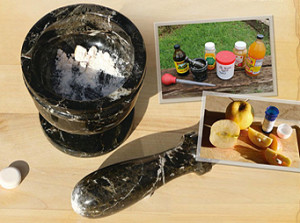A Spoonful of Sugar Helps the Medicine Go Down
Click here to read the complete article220 – November/December, 2016
By Kristen Spinning
 I’d made it over a year with my horse before the first emergency vet call, so I really didn’t know what to expect as the collection of jars and syringes piled up on the tailgate of the veterinarian’s truck. Yet, as soon as he uttered those words, “they put flavoring in it, so you shouldn’t have any problem,” my gut reflexively clenched.
I’d made it over a year with my horse before the first emergency vet call, so I really didn’t know what to expect as the collection of jars and syringes piled up on the tailgate of the veterinarian’s truck. Yet, as soon as he uttered those words, “they put flavoring in it, so you shouldn’t have any problem,” my gut reflexively clenched.
Pushing on with the enthusiasm of being the best horse-mom I could be, I approached the first round of dosing with confidence. Squirt in the bute….check…no problem, just like wormer. A barn buddy distracted me for a moment, but when I refocused on my task I discovered a pasty lump on the ground. It resembled a strange, white chocolate truffle dusted with bits of hay and dirt. My horse casually looked down the aisle as if to say, “I have no idea what you’re talking about.” I knew then that the next 10 days were going to require some creativity
We’re all passionate about keeping our horses healthy and especially cognizant of the added physical and mental demands that competition places upon them. To keep our equine athletes at optimum condition, we supplement their diet with concentrated nutrients. To support them when sick or injured, we ply them with medication. Understandably, vets don’t want to ratchet up our anxiety level by letting us in on all the potential problems of administering medications. If we worry about getting that pill into a cranky half-ton animal, we will fulfill our fears. But minimizing the challenges leaves many horse owners at a loss when it turns out not to be that easy after all.
For a creature that’s built to graze on tasty green things, it goes against every instinct to ingest some of the concoctions we humans dream up. Dr. Allan Hamilton is a brain surgeon, educator, horse trainer, and celebrated author of the horsemanship books Zen Mind, Zen Horse, and Lead With Your Heart. He considers the evolutionary aspects of horses when trying to understand why they do…or don’t do what they’re asked. “Horses can’t throw up,” he says. “Once a horse has eaten something, he’s committed. He’s either going to die from it, or survive it.” From that perspective, it’s understandable that horses are highly resistant to swallowing items that don’t match the taste or scent profile that they are accustomed to ingesting.
Click here to read the complete article220 – November/December, 2016










